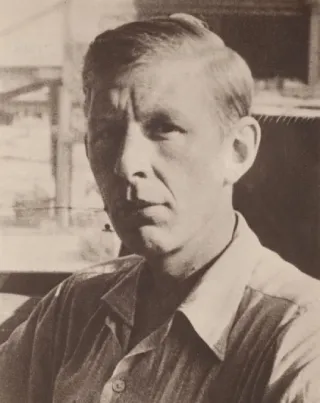Biography of Wystan Hugh Auden

| date | place | |
|---|---|---|
| born | February 21, 1907 | York (England) |
| died | September 29, 1973 | Vienna (Austria) |
Wystan Hugh Auden, often referred to as W. H. Auden, born on February 21, 1907, in York, England, was one of the most influential poets of the 20th century, known for his profound impact on both English and American literature. Auden's early life was steeped in intellectual and cultural influences. He was raised in a middle-class, Anglican family, and his father, a physician, sparked his early interest in psychology and the sciences, while his mother's musical background influenced his love for rhythm and language. Wystan Auden was educated at renowned institutions, including Christ Church, Oxford, where he initially studied biology but later switched to English literature. It was at Oxford that he met fellow poets like Cecil Day-Lewis and Stephen Spender, who, along with Auden, were later associated with the "Auden Group," known for their left-wing political views during the 1930s. In 1930, Auden gained public attention with the publication of his first book, Poems, which established him as a leading voice in modern poetry. His early works often addressed social and political issues, reflecting the turbulent times of the interwar period. W. H. Auden also collaborated with playwright Christopher Isherwood on several plays, further cementing his reputation as a politically engaged writer. Seeking to distance himself from his political reputation and to explore new themes, W. H. Auden moved to the United States in 1939, where he became a naturalized citizen in 1946. His poetry from this period, including the famous "September 1, 1939," reflects a shift towards more personal and religious themes. His long poem The Age of Anxiety won the Pulitzer Prize in 1948 and became emblematic of the existential uncertainty of the post-war era. W. H. Auden was also a prolific writer of essays, reviews, and other prose, contributing significantly to literary criticism and intellectual discourse throughout his life. His personal life was equally complex; he was openly gay and had a lifelong partnership with Chester Kallman, with whom he collaborated on several operatic and literary projects. Auden also had a brief marriage with Erika Mann in 1935, a marriage of convenience to help her escape Nazi Germany. Despite facing fluctuating critical reception during his lifetime, Auden's influence grew after his death, with many of his poems becoming widely known through popular media. He passed away on September 29, 1973, in Vienna, Austria, and was buried in Kirchstetten, where he had spent his later years. W.H. Auden's poems are renowned for their exploration of complex themes such as love, politics, and existential angst, making him one of the most influential poets of the 20th century. His poetry often reflects the socio-political turmoil of his time, with works like "September 1, 1939" capturing the anxiety of impending war and the fragility of human relationships. Auden's ability to combine traditional poetic forms with modernist themes has made his poems enduringly popular, resonating with readers who appreciate both their intellectual rigor and emotional depth. Later in his career, W.H. Auden's poems began to focus more on personal and philosophical issues, such as faith, mortality, and the search for meaning in a chaotic world. His Pulitzer Prize-winning poem "The Age of Anxiety" exemplifies this shift, offering a profound meditation on human isolation and the quest for self-understanding in the post-war era. Auden's mastery of language and his insightful exploration of universal themes have ensured that his poems remain a central part of literary study and continue to be cherished by readers around the world.
Feel free to be first to leave comment.